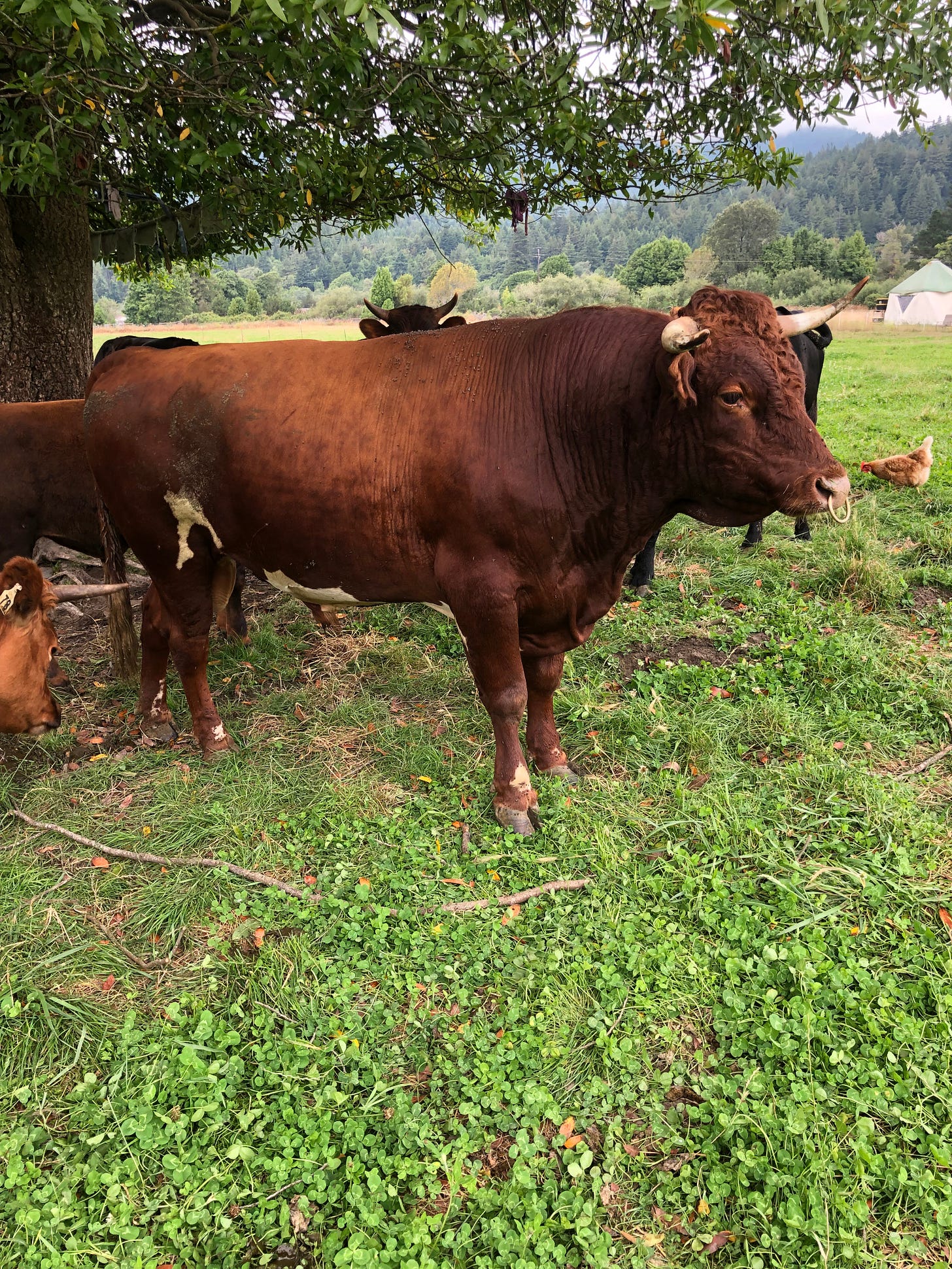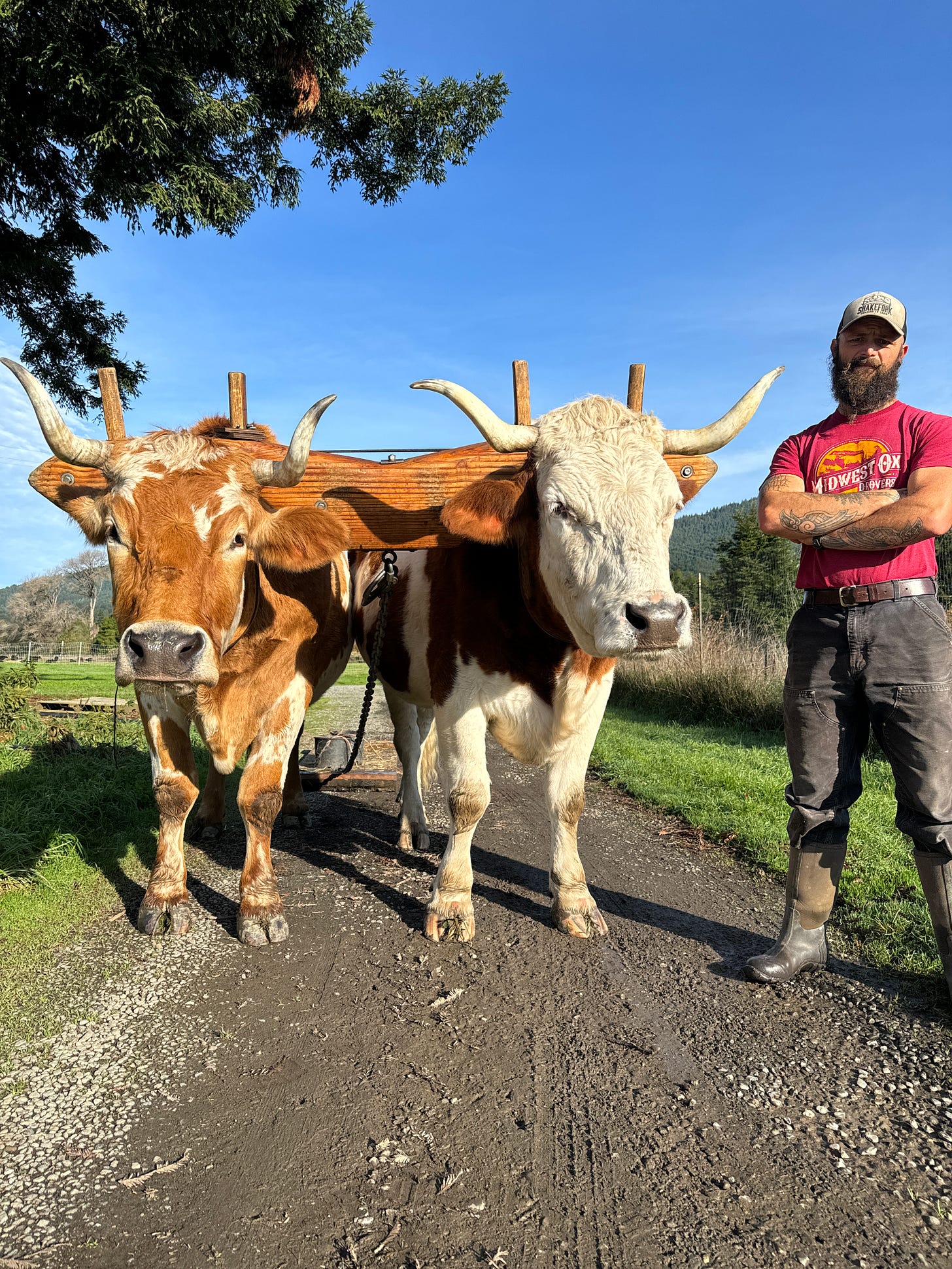Bulls and Bullshit
The bull is one of the most important members of the herd. As the rooster is for the flock, the ram for the fold, and the man for the family, the bull holds a central, indispensable place in the life and structure of the herd. Over the years, we’ve had a number of bulls on our farm, and I’ve learned more from them than I ever expected. Lessons about leadership, presence, power, control, and responsibility—all of these things can be observed in how a bull carries himself within this world. The bull is a potent image in our minds and in our culture. We all have preconceived notions of what a bull is and what he’s like. It’s easy to picture that fighting bull, head down, pawing at the dirt, nostrils flaring, ready to charge anything that moves. It’s the image you see in bullfights, and in rodeos. But that’s not the only truth about bulls. It’s less common to picture the bull as the quiet cornerstone of the family line, the calm, steady sire of generations.
We’ve had good bulls and we’ve had bad ones. Like all cattle, bulls exist within a social hierarchy, a dominative order, but the bull’s role in that structure is an interesting one. You’d think he’s always at the top, throwing his weight around and bossing everyone else, but that’s not necessarily the case. A good bull doesn’t have to push anyone around to prove he’s the boss. He knows who he is, and so does everybody else. He doesn’t waste energy establishing dominance because he already has it. There’s an unspoken authority that a solid, well-minded bull brings to the herd. The cows respect him, and even the calves know to give him space. But he’s not always proving it in some flashy or aggressive way. He doesn’t need to.
Now, we’ve also had bulls who did feel the need to prove something. There was one bull in particular I remember well. He had it in his head that the only way to be in charge was to keep the herd under constant control. He’d push them into corners and pen them in, not letting anybody leave or graze where they wanted. His protective instincts were on overdrive. To him, maybe he thought he was doing his job—keeping everyone safe by keeping everyone under his watchful eye. But what he was really doing was being an asshole. And it took a toll. That winter, when he was our herd sire, we ended up with more areas of mud and compaction than we’d ever had before. The cows didn’t get to spread out like they normally would, because he kept pushing them all into the same tight spots. Eventually, we had to get rid of him. He was overly aggressive, and while that’s always a possibility when you’re dealing with bulls, it doesn’t have to be that way. A bull like that might get the job done in terms of breeding, but at what cost?
Observation is one of the most underrated traits of a good bull. People don’t always think of bulls as observant creatures. They think of them as blunt-force animals, heads down, pushing through whatever’s in their path. But that’s not how it works. A good bull knows the status of his herd. He knows where every cow is and where they fit into the family system. His most obvious job is to breed the cows, sure. He keeps track of when every female is fertile. He doesn’t miss a cycle. A good bull makes sure every cow is bred at the right time. But beyond that, he’s also responsible for the herd’s safety. He’s aware of what’s going on at all times. He knows when something’s not right.
One of the biggest things I’ve learned from observing bulls is the importance of presence—not fear. You should always know where the bull is within the herd, but you shouldn’t have to be afraid of him. A good bull has presence. You feel him in the pasture. You know he’s there. He’s watching, aware, in charge. But he isn’t stomping around making a big show of it. He doesn’t need to. That’s something I’ve thought about a lot when it comes to being a man. Men have that same ability to carry presence, but too often we misuse it. We can suck the safety out of a room if we’re not careful. I’ve witnessed it in myself. When I get angry, even if I think I’m in the right, the people around me can feel it in their bones. They don’t feel safe anymore. Even if my instincts are telling me to control a situation or protect the people I love, if I do it with aggression, I’m going to get the opposite result. People don’t feel protected when a man is aggressive—they feel unsafe, even when his intentions are good.
There’s a lot of talk these days about “toxic masculinity.” I hate the term, mostly because it gets thrown around so easily, and often without any real understanding. But I think, at its core, what people are often pointing at is misguided protective instinct. It’s the bull who thinks he’s doing the right thing by forcing everyone into a corner. His instincts are true, but his application is oppressive. The same thing happens to men. We want to protect. We want to provide. We want to lead. But if we’re not careful, if we’re not observant, we end up doing more harm than good. Not every bull has good presence. Not every man does either. But I try to emulate the ones who do.
I’m sure that bull we had—the one who dominated the herd so tyrannically—thought he was keeping everyone safe. His instincts were right, but his application was wrong. That’s where observation comes in. A good bull notices what’s happening, and he adjusts. He knows how his presence is affecting the herd. He doesn’t just act on instinct—he acts with awareness. As men, we should do the same. We need to notice how our behavior and emotional responses affect the people around us. And when we realize something’s off, we need to be willing to change. That’s not weakness; that’s leadership.
Bulls have taught me a lot about bullshit. You don’t have to be the loudest, meanest animal in the pasture to lead. You don’t have to prove yourself over and over. A good bull doesn’t waste time with all that. He knows who he is. The herd knows who he is. That’s enough.






We hire in an Aberdeen Angus bull for 6 weeks every autumn. Lovely docile brutes. But last year I upset a new one! 20 minutes dancing round a barn pole till someone arrived to distract him and I could escape. Frightened the crap out of me. Afraid he went for the chop.
Very interesting topic!
Years ago I worked as a large animal vet in a Plain community, where bulls are still kept on small dairy farms. My impression from that experience is that bulls are not so much protective of their cows, but possessive of them. A subtle word difference, but maybe helps explain why keeping a bull as part of a beef herd is different from keeping one as part of a milking herd where humans have to handle the cow's every day. Serms like most bulls don't like humans messing with their cows? I'd be interested to hear what others think about it.